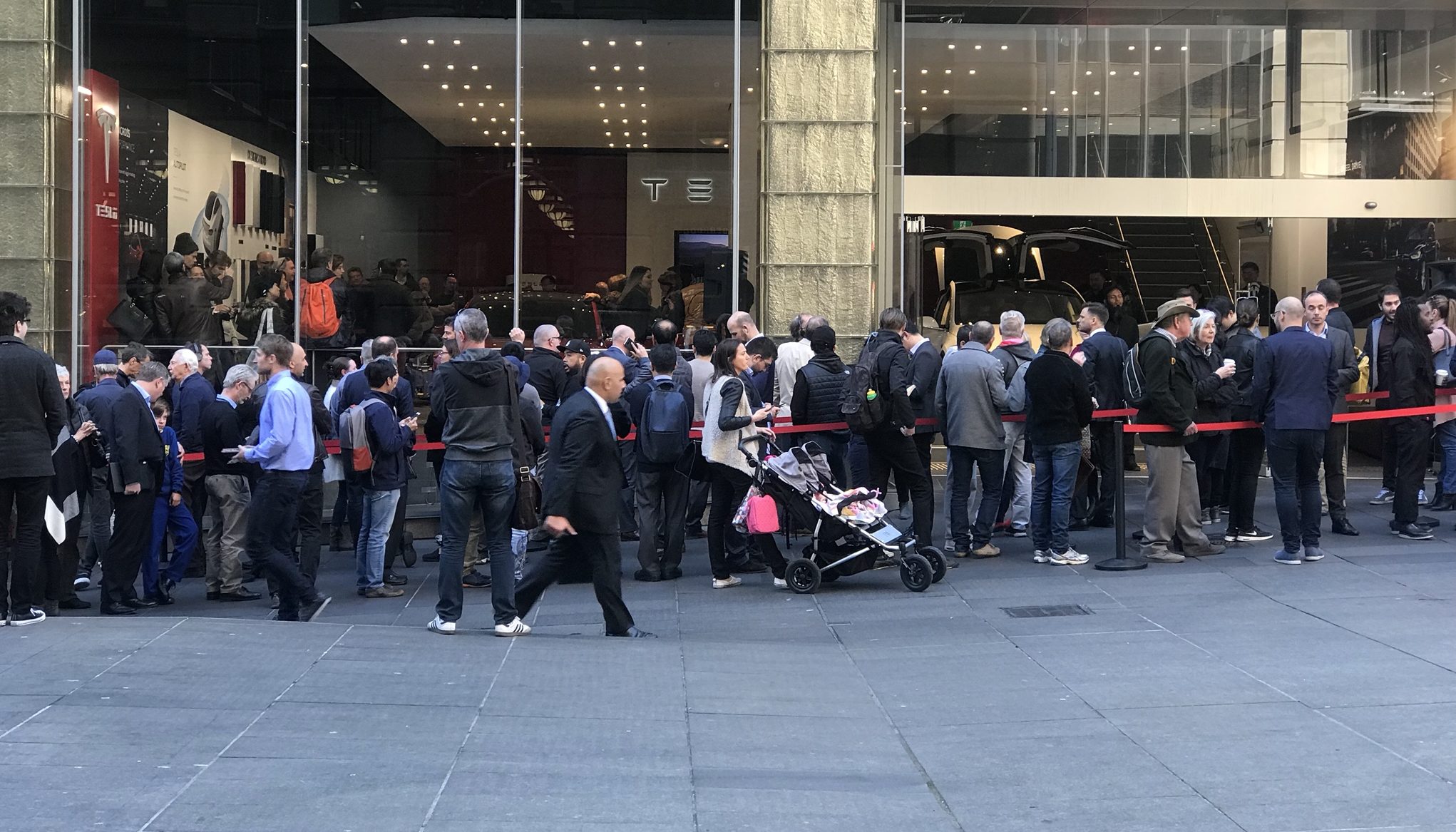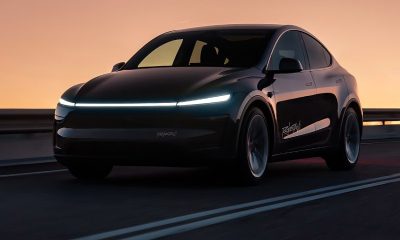

Investor's Corner
Tesla extends $1.1B warehouse loan agreements amid signs of strong Model 3 demand
A Form 8-K recently filed by Tesla to the United States Securities and Exchange Commission has revealed that the company extended its $1.1 billion warehouse loan agreements with Deutsche Bank AG for another year. The revised terms outlined in Tesla’s Form 8-K state that the agreements’ borrowing availability has been extended from August 17, 2018, to August 16, 2019. The maturity date of the agreement was also extended from September 2019 to September 2020.
Following is the text of Tesla’s recent Form 8-K submitted to the SEC.
Extension of Vehicle Lease Warehouse Agreements
On August 16, 2018, certain subsidiaries of Tesla, Inc. (“Tesla”) that are respectively parties to (i) an Amended and Restated Loan and Security Agreement (the “A&R 2016 Warehouse Agreement”) and (ii) a Loan and Security Agreement (the “2017 Warehouse Agreement,” and together with the A&R 2016 Warehouse Agreement, the “Warehouse Agreements”), each dated August 17, 2017, with Deutsche Bank AG, New York Branch as administrative agent and the other parties named therein, entered into an amendment to each of the Warehouse Agreements (together, the “Amendments”).
Among other changes, the Amendments extended the borrowing availability date under the Warehouse Agreements from August 17, 2018, to August 16, 2019, and extended the maturity date of the Warehouse Agreements from September 2019 to September 2020. The aggregate lender commitment, which is shared between the Warehouse Agreements, remains unchanged at $1.1 billion.
Warehouse loan agreements are utilized as tools to help finance inventory. Last October, Tesla raised the credit line at the German bank by $500 million to $1.1 billion, and during that time, the California-based electric car maker noted that it was planning an expansion of its in-house leasing program. That said, even with the recent extension of the warehouse agreement, the aggregate lender commitment of $1.1 billion remains unchanged.
Tesla’s recent 8-K Form could be accessed in full here.
Tesla’s recent 8-K filing comes as the demand for the Model 3 sedan showed encouraging signs after the vehicle was previewed in Australia for the first time. After sustaining the Model 3’s 5,000/week production rate during multiple weeks in July, Tesla announced earlier this month that it is bringing the electric car to Australia and New Zealand. Reservation holders residing in the two countries received invitations for viewings of the vehicle at Tesla’s stores in Sydney, Melbourne, Brisbane, and Auckland.
The Model 3’s viewings in Australia proved to be successful. Posts uploaded of the event on Twitter revealed lines of people lining up to get a hands-on experience with the electric car. One of the Model 3 reservation holders, Andreas Stephens of Sydney, even noted in a statement to Drive that the electric car would be his first vehicle in 25 years.
“I’m not a car enthusiast as such; I never had a need to upgrade my car. When I bought my first car my dream was to have an electric car as my next car. But at the time, in the early 1990s, that seemed like a pretty unrealistic expectation. So I’m really excited that I’m now actually able to get an electric car. It’s fantastic, more than anything I’ve experienced in a car,” he said.
Queue at Tesla Martin Place to see Tesla Model 3 pic.twitter.com/UbEJ9KC1dc
— Heath Walker (@TexWalkerRanger) August 21, 2018
In the United States, Model 3 production appears to be hitting its stride. Apart from recently passing the 100,000-vehicle mark in its VIN registrations for the electric car, Tesla also appears to ba pacing towards an improved pace for the vehicle’s production. This was highlighted by George Galliers of Evercore ISI after an extensive tour of the Fremont factory, who noted that Tesla could hit as much as 8,000 Model 3 per week with very little capital expenditure.
“Tesla seems well on the way to achieving a steady weekly production rate of 5,000 to 6,000 units per week. We are incrementally positive on Tesla following our visit. We have confidence in their production. We did not see anything to suggest that Model 3 cannot reach 6k units per week and 7k to 8k with very little incremental capital expenditure. Focusing on the fundamentals and setting aside talk of privatization, we are incrementally positive on Tesla following our visit,” the analyst noted.
Elon Musk
Tesla analyst issues stern warning to investors: forget Trump-Musk feud

A Tesla analyst today said that investors should not lose sight of what is truly important in the grand scheme of being a shareholder, and that any near-term drama between CEO Elon Musk and U.S. President Donald Trump should not outshine the progress made by the company.
Gene Munster of Deepwater Management said that Tesla’s progress in autonomy is a much larger influence and a significantly bigger part of the company’s story than any disagreement between political policies.
Munster appeared on CNBC‘s “Closing Bell” yesterday to reiterate this point:
“One thing that is critical for Tesla investors to remember is that what’s going on with the business, with autonomy, the progress that they’re making, albeit early, is much bigger than any feud that is going to happen week-to-week between the President and Elon. So, I understand the reaction, but ultimately, I think that cooler heads will prevail. If they don’t, autonomy is still coming, one way or the other.”
BREAKING: GENE MUNSTER SAYS — $TSLA AUTONOMY IS “MUCH BIGGER” THAN ANY FEUD 👀
He says robotaxis are coming regardless ! pic.twitter.com/ytpPcwUTFy
— TheSonOfWalkley (@TheSonOfWalkley) July 2, 2025
This is a point that other analysts like Dan Ives of Wedbush and Cathie Wood of ARK Invest also made yesterday.
On two occasions over the past month, Musk and President Trump have gotten involved in a very public disagreement over the “Big Beautiful Bill,” which officially passed through the Senate yesterday and is making its way to the House of Representatives.
Musk is upset with the spending in the bill, while President Trump continues to reiterate that the Tesla CEO is only frustrated with the removal of an “EV mandate,” which does not exist federally, nor is it something Musk has expressed any frustration with.
In fact, Musk has pushed back against keeping federal subsidies for EVs, as long as gas and oil subsidies are also removed.
Nevertheless, Ives and Wood both said yesterday that they believe the political hardship between Musk and President Trump will pass because both realize the world is a better place with them on the same team.
Munster’s perspective is that, even though Musk’s feud with President Trump could apply near-term pressure to the stock, the company’s progress in autonomy is an indication that, in the long term, Tesla is set up to succeed.
Tesla launched its Robotaxi platform in Austin on June 22 and is expanding access to more members of the public. Austin residents are now reporting that they have been invited to join the program.
Elon Musk
Tesla surges following better-than-expected delivery report
Tesla saw some positive momentum during trading hours as it reported its deliveries for Q2.

Tesla (NASDAQ: TSLA) surged over four percent on Wednesday morning after the company reported better-than-expected deliveries. It was nearly right on consensus estimations, as Wall Street predicted the company would deliver 385,000 cars in Q2.
Tesla reported that it delivered 384,122 vehicles in Q2. Many, including those inside the Tesla community, were anticipating deliveries in the 340,000 to 360,000 range, while Wall Street seemed to get it just right.
Tesla delivers 384,000 vehicles in Q2 2025, deploys 9.6 GWh in energy storage
Despite Tesla meeting consensus estimations, there were real concerns about what the company would report for Q2.
There were reportedly brief pauses in production at Gigafactory Texas during the quarter and the ramp of the new Model Y configuration across the globe were expected to provide headwinds for the EV maker during the quarter.
At noon on the East Coast, Tesla shares were up about 4.5 percent.
It is expected that Tesla will likely equal the number of deliveries it completed in both of the past two years.
It has hovered at the 1.8 million mark since 2023, and it seems it is right on pace to match that once again. Early last year, Tesla said that annual growth would be “notably lower” than expected due to its development of a new vehicle platform, which will enable more affordable models to be offered to the public.
These cars are expected to be unveiled at some point this year, as Tesla said they were “on track” to be produced in the first half of the year. Tesla has yet to unveil these vehicle designs to the public.
Dan Ives of Wedbush said in a note to investors this morning that the company’s rebound in China in June reflects good things to come, especially given the Model Y and its ramp across the world.
He also said that Musk’s commitment to the company and return from politics played a major role in the company’s performance in Q2:
“If Musk continues to lead and remain in the driver’s seat, we believe Tesla is on a path to an accelerated growth path over the coming years with deliveries expected to ramp in the back-half of 2025 following the Model Y refresh cycle.”
Ives maintained his $500 price target and the ‘Outperform’ rating he held on the stock:
“Tesla’s future is in many ways the brightest it’s ever been in our view given autonomous, FSD, robotics, and many other technology innovations now on the horizon with 90% of the valuation being driven by autonomous and robotics over the coming years but Musk needs to focus on driving Tesla and not putting his political views first. We maintain our OUTPERFORM and $500 PT.”
Moving forward, investors will look to see some gradual growth over the next few quarters. At worst, Tesla should look to match 2023 and 2024 full-year delivery figures, which could be beaten if the automaker can offer those affordable models by the end of the year.
Investor's Corner
Tesla delivers 384,000 vehicles in Q2 2025, deploys 9.6 GWh in energy storage
The quarter’s 9.6 GWh energy storage deployment marks one of Tesla’s highest to date.

Tesla (NASDAQ: TSLA) has released its Q2 2025 vehicle delivery and production report. As per the report, the company delivered over 384,000 vehicles in the second quarter of 2025, while deploying 9.6 GWh in energy storage. Vehicle production also reached 410,244 units for the quarter.
Model 3/Y dominates output, ahead of earnings call
Of the 410,244 vehicles produced during the quarter, 396,835 were Model 3 and Model Y units, while 13,409 were attributed to Tesla’s other models, which includes the Cybertruck and Model S/X variants. Deliveries followed a similar pattern, with 373,728 Model 3/Ys delivered and 10,394 from other models, totaling 384,122.
The quarter’s 9.6 GWh energy storage deployment marks one of Tesla’s highest to date, signaling continued strength in the Megapack and Powerwall segments.

Year-on-year deliveries edge down, but energy shows resilience
Tesla will share its full Q2 2025 earnings results after the market closes on Wednesday, July 23, 2025, with a live earnings call scheduled for 4:30 p.m. CT / 5:30 p.m. ET. The company will publish its quarterly update at ir.tesla.com, followed by a Q&A webcast featuring company leadership. Executives such as CEO Elon Musk are expected to be in attendance.
Tesla investors are expected to inquire about several of the company’s ongoing projects in the upcoming Q2 2025 earnings call. Expected topics include the new Model Y ramp across the United States, China, and Germany, as well as the ramp of FSD in territories outside the US and China. Questions about the company’s Robotaxi business, as well as the long-referenced but yet to be announced affordable models are also expected.
-

 Elon Musk5 days ago
Elon Musk5 days agoTesla investors will be shocked by Jim Cramer’s latest assessment
-

 News1 week ago
News1 week agoTesla Robotaxi’s biggest challenge seems to be this one thing
-

 Elon Musk2 weeks ago
Elon Musk2 weeks agoFirst Look at Tesla’s Robotaxi App: features, design, and more
-

 News2 weeks ago
News2 weeks agoWatch Tesla’s first driverless public Robotaxi rides in Texas
-

 News2 weeks ago
News2 weeks agoWatch the first true Tesla Robotaxi intervention by safety monitor
-

 Elon Musk2 weeks ago
Elon Musk2 weeks agoTesla officially launches Robotaxi service with no driver
-

 Elon Musk1 week ago
Elon Musk1 week agoA Tesla just delivered itself to a customer autonomously, Elon Musk confirms
-

 News2 weeks ago
News2 weeks agoTesla Robotaxi rollout proves that Elon Musk still delivers, even if it’s late

















